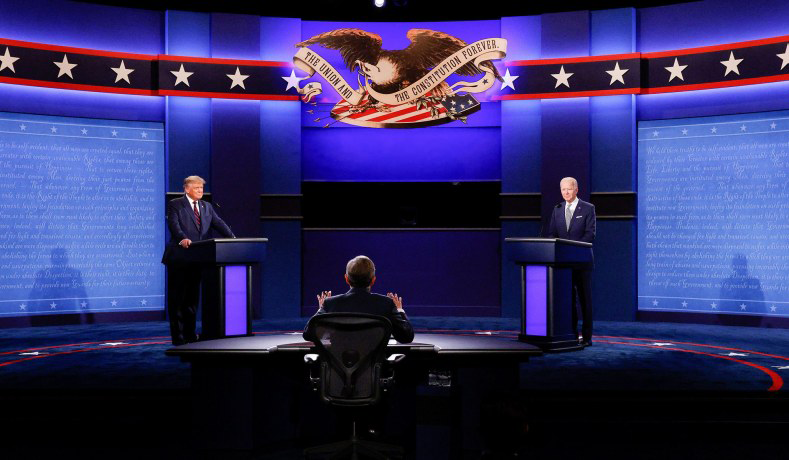The Debates (Probably) Won’t Change Anything

Image courtesy of National Review
By Cameron Veilleux
Dr. Niels Bohr, Nobel laureate in physics, once said that “prediction is very difficult, especially if it’s about the future.” When it comes to determining the future results of the upcoming presidential debates, the past can be a very useful guide. Last election cycle, the presidential debates did not generate any noteworthy impact on the supporters of either candidate. An analysis of past data suggests that this year’s debates will have a very minimal effect on the results of the upcoming presidential election unless one of the candidates has a disastrous performance.
History shows that it’s very difficult to quantify the impact of a presidential debate on the electorate. In the 2016 election cycle, then-candidate Trump bragged about his post-debate performances in “flash polls.”. While flash polls can be used to indicate the immediate enthusiasm behind a candidate after a debate, since they are easy to distribute and take, they’re usually considered to be unreliable because bots can manipulate the results.The promotion of these polls can make it very confusing to determine accurate results. Instead, it makes more sense to wait for the release of polls that use traditional methods that are based on scientific standards and yield far more accurate results.
Even when a candidate wins a debate by a wide margin, that does not always correlate with positive electoral results. Indeed, Gallup found that, contrary to the results of the immediate flash polls, voters were overwhelmingly convinced that Clinton won all three presidential debates. When Gallup asked voters who they thought won the debates, the results yielded Clinton winning the first debate by 60-31, the second debate by 53-35, and the third debate by 61-27. Despite the thunderous applause for her debate performance, however, Clinton went on to lose the presidential election. While debate performance does not always accurately predict the winner of the election, it is possible for the debates to influence the results in other ways, such as by energizing each candidate’s base or by changing the minds of independents.
The political identity of Trump supporters closely revolves around the president, which makes it very difficult for Biden to change their minds during the debate. According to a Gallup poll, Trump currently enjoys a 93% approval rating among Republicans. Additionally, a Pew Research Center survey suggests that only 4% of Trump supporters admit “there is a chance” that they change their mind for any reason. Trump is well aware of the devoted nature of his supporters, once famously saying that he “could stand in the middle of 5th Avenue and shoot somebody” without losing voters. According to a poll from Huffington Post and YouGov, 49% of people who voted for Trump in 2016 consider themselves to be supporters of Trump but not supporters of the Republican party, indicating the absolute charismatic authority that Trump holds over their vote.
Likewise, the debates are unlikely to change the minds of a majority of Biden supporters. According to a poll from Pew Research Center, 56% of Biden supporters say that they are voting for him because “he is not Trump.” If accurate, then this poll means that Biden’s debate performance would do very little, if anything, to change the minds of these voters. Even if Biden performed terribly, he still wouldn’t be Trump. According to the same poll, 32% of Biden supporters will vote for him for either his “leadership” or his “personality,” two metrics that Trump might find difficult to challenge in such a well-established politician. According to a poll from Quinnipiac University published on September 2, only 3% of likely voters had not yet decided who to vote for, a percentage so small that it sits safely within the poll’s margin of error.
Despite all of this, however, history shows that major gaffes during debates can contribute to a candidate’s defeat. In 1976, Ford made the infamous mistake of claiming that Eastern Europe was not under “Soviet domination.” Ford lost the election. Again in 1988, Michael Dukakis suffered after giving a passionless answer when asked if he would support the death penalty for a man who raped his wife. Dukakis lost the election. After his clear victory in the first debate, Romney accidentally made a false claim about Obama in the second debate, which drew an immediate (and embarrassing) fact check from the moderator. Romney lost the election. While it’s true that a lot more went into these elections, these gaffes really hurt.
Predicting the future can be very difficult, especially in a volatile political environment, but both relevant history and current polling data suggest that the debates won’t matter unless one candidate suffers a devastating defeat. At this point in the race, it seems that everyone has already decided how they’re going to vote and it’s very unlikely that the debates will change anyone’s mind. The results of the election are going to be difficult to quantify and there is evidence from last election cycle that they don’t even matter. Of course, it is always possible that the debates do change the minds of some voters, but it would require catastrophic gaffes from one of the candidates and a notable triumph from the other.







